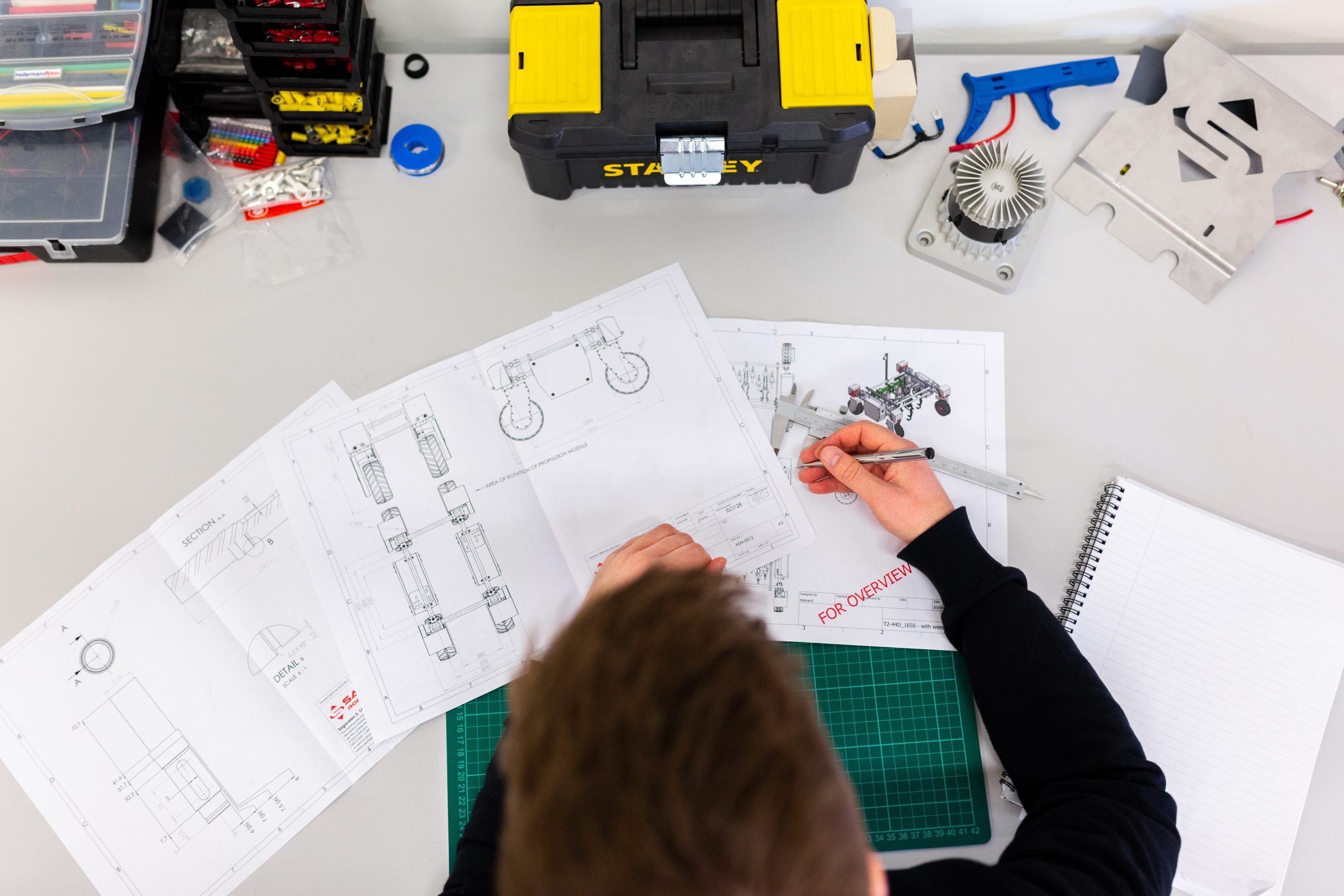One of the biggest benefits of getting a degree in engineering is that it is a very flexible qualification that you can do a lot with, especially once you have some engineering work experience behind you. For engineers who are looking for a change, there is the option to move on from engineering and problem-solving work into a more business-oriented, management role where you will be tasked with overseeing projects and running teams. Despite this role being different to what you might be used to as an engineer, the good news is that you don’t have to completely give up the STEM aspect. In fact, some of the best engineering managers are often professionals who have spent some time working as an engineer and understand both the engineering and the management side of the job, putting them at an advantage when it comes to connecting with their team and getting the best results.
Project management and other higher-level positions in the engineering industry give engineers the opportunity to build new skills while working on engineering projects directly, so it’s no surprise that this is one of the best opportunities for engineers looking to climb the career ladder.
The Engineering Project Manager Role
Project managers are needed to work in a wide range of industries including engineering, construction, IT, software and more. Project managers play a key role in any engineering project. They are responsible for planning, overseeing and making sure that the project is completed as expected. They are also tasked with overseeing workers, ensuring that the project is within the allocated budget, and working out the project schedule. They need to ensure that the project is planned and executed properly in order to keep it moving forward and be ready for any problems that could hold the project up or reduce efficiency.
The role of a project manager in any industry, including engineering, is naturally one that involves a lot of planning and oversight. An engineering project manager should also be an excellent problem-solver, which is why this position is a great option to consider for experienced engineers who are used to and skilled at problem-solving as part of their job. The project manager also needs to be skilled at solving complex problems to ensure that each project is completed successfully and on time in a manner that is streamlined and efficient. They will also need to conduct regular risk assessments along with developing contingency plans, ensuring that solutions to potential problems are found and that any delays or unnecessary expenses are avoided.
Skills Needed To Work as an Engineering Project Manager
Engineers will have often already developed a lot of the skills that they need to work successfully as an engineering project manager. This role requires excellent analytical skills alongside management skills and people skills. Project managers are not only responsible for their own work but are also responsible for management and leadership of teams, interacting with a wide range of different people on a daily basis. If you are interested in getting into this role, a masters in engineering management online program from uOttawa University may be an ideal choice of program to help you develop the necessary skills you need to succeed.
If you are currently working as an engineer in a successful career and want to move up the career ladder and take on more responsibility in your work, you might have considered moving up the ladder into engineering management. In this role, you will be responsible for overseeing projects, management of teams, and ensuring that the project runs smoothly, on schedule, and within budget. For this role, employers are often looking for good engineers or engineering management professionals with a set of specific skills. The most in-demand skills for this role include:
Leadership
The ability to inspire and lead a team to successfully accomplish their goals is one of the most important skills that you can possess as an engineering project manager. As an engineering manager, you will need to have a clear vision of what your completed project should look like and be able to clearly communicate this to your team. Leadership skills enable you to have a clear sense of direction and purpose, which naturally leads to a better ability to evoke confidence in your leadership from your team, motivating the team to keep moving forward toward success no matter what you are working on. A good engineering manager is often an influential, hands-on leader that is trusted and respected by their team, leading by example when it comes to being disciplined, dedicated and hard-working, and demonstrating a positive, can-do attitude while being realistic at the same time.
Sense of Responsibility
Engineering project managers will often have to make some difficult decisions, which is why a sense of responsibility is one of the main qualities that is needed to work in this role. While everybody enjoys taking responsibility for the projects that have been successful, the engineering manager also needs to be responsible for the projects that do not go so well, using these situations as an opportunity to learn more about what went wrong and what can be improved in the future to ensure that projects can be completed more successfully without the same mistakes being repeated.
A good engineering project manager must be somebody who is prepared to take responsibility for the decisions and actions that they take regardless of whether the outcome is positive or negative. The best management professionals in engineering are able to admit when things have gone wrong, be honest when it comes to their mistakes, and view any mistakes as an opportunity to learn and improve.
Decision Making and Critical Thinking Skills
Most engineers are used to working in a role where they need to make the right judgment calls and decisions, which can often lead to them being a natural fit for a role as an engineering project manager. In an engineering role, the decisions that you make can often carry a lot of weight, and engineers also need to consider the ethics of anything that they decide to go ahead with. When working as an engineering project manager, the need to make the right decisions at the right time is even more important. The project manager is often the professional that teams will go to when they need answers, advice and guidance, and there may sometimes be difficult decisions to make on behalf of the team or the project that will fall on the shoulders of the project manager.
In this role, it is important to be able to approach any decision that you are tasked with making from a number of perspectives using data, past experience and logic. The ability to be adaptable and flexible when making decisions is highly sought-after in many engineering project management roles, along with a demonstrable understanding of how different situations may require various approaches. The ability to think critically and be confident when making any decision will help any engineering manager inspire commitment and respect from their team.
Communication
As is the case with the vast majority of management positions in any industry, working as an engineering manager requires you to be a strong communicator in order to succeed in this role. Engineering managers are responsible for leading teams, and they need to be able to listen to team members effectively along with the ability to clearly get ideas and instructions across in a way that is easy for others to understand. Active listening is a key skill for engineering project managers, as this will allow them to enjoy better communication with their team along with building better relationships with the people that they work alongside.
Along with this, engineering project managers will often spend their time communicating with a variety of different people who may not always have engineering knowledge. Because of this, it is important for them to develop the ability to explain engineering terms and ideas in a way that somebody without any engineering training or knowledge will be able to easily understand. As an engineering project manager, you are likely going to be spending a lot of your time putting often very complex ideas and concepts into simple, layman’s terms to ensure that everybody involved in the project is able to get a clear understanding of it and keep up with it.
Attention to Detail
Anybody who has worked as an engineer for some time will know that it is a very complex field that involves a wide range of analytical, technical, mathematical and scientific problems, meaning that engineers need to have a strong attention to detail. As the person who is responsible for overseeing the engineering projects, engineering project managers need to be extremely detail-oriented. The best type of person for this role is somebody who never misses even the smallest of details and is able to quickly notice things before others. In many engineering projects, even small errors and mistakes can lead to serious issues with the completed project, and one of the main parts of the role of the engineering manager will involve understanding every aspect of the project right down to the tiniest details, allowing them to check and keep on top of the quality and accuracy of the project as it is completed. They need to be able to spot any weak points and potential for mistakes quickly and deal with them as soon as possible in order to avoid any delays in the project.
Delegation
Being able to effectively delegate a range of responsibilities and duties to different team members is another key aspect of working as an engineering project manager. All good engineering managers know that it is important for them to be involved and hands-on with the project and lead by example to inspire their team; however, they also have a keen understanding of the importance of being able to step back and view the bigger picture, which often involves delegating various project tasks to other team members rather than personally taking them on. A successful engineering project manager is able to get the balance right when it comes to the work that they do and the work that they delegate to others, allowing them to avoid becoming burned out and risking the failure of the project. When it comes to successfully delegating to a team, a manager should possess strong collaborative and teamwork skills, including being aware of the strengths and weaknesses of each team member to make it easier to choose the right person for the job when delegating any task.
Integrity and Honesty
Any good manager or leader, no matter the industry, tends to be somebody who is honest and always works with integrity, doing the right thing in any situation. In engineering in particular, project managers need to be people with a lot of integrity since there are strict ethical codes of conduct that all projects and teams will need to adhere to. A lot of the work that is done by engineers is going to impact the public, and engineering managers need to be able to hold themselves and the people that they work with to the highest ethical standards. A good project manager is able to keep the project under budget without using unethical, cost-cutting methods, and is not afraid to call this out when they see it. All engineers are responsible for reporting anything that is potentially unethical or risky, and as the professional that this is likely going to be reported to in the first place, the engineering project manager needs to have a clear understanding of ethics in engineering and a no-tolerance attitude toward anything that could potentially cause danger or harm to others.
Engineering project management is an exciting career choice for any engineer looking to move up the career ladder and into a role that involves working with people, managing teams and overseeing projects. Along with strong engineering knowledge, excellent leadership and management skills are also required to succeed in this role.
















